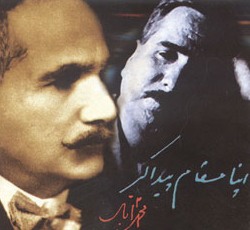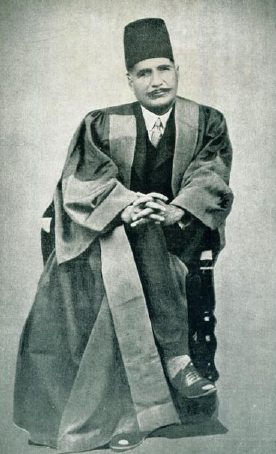Iqbal bhi Iqbal say aagah naheen hai
Mea culpa, Mea culpa, Mea culpa!
After a lapse of some fifty years I am re-visiting Iqbal’s Urdu poetry. It is a revisitation I would highly recommend we all do.
To begin with I was not English-medium but talaash–ai–maash turned me into one – I being part of the first generation of Pakistani brain-drainers. Confessedly again, I was brought up appreciating and enjoying Urdu and Persian prose and verse. English became the language of my thought and expression, as a consequence of my long working life as Diaspora.
Studying once again, today, the Urdu poetry of Iqbal is opening up entirely new vistas and new dimensions of understanding for me. What Iqbal wrote a hundred years ago has not changed, it is my understanding of him today compared to decades ago that has. This can happen to all of us in time. We all grow up, mature and find new meanings that may have eluded us earlier.
For this neglect I have no one else to blame but myself.
Zamaney kay andaaz badley gayey
Naya raag haiN, saaz badley fayey
There are, of course, many Iqbal’s that we have ourselves created and nurtured.
There is the official Iqbal that PTV, Radio Pakistan and the ‘officialdom’ projects and repeatedly broadcasts.
The official Iqbal is mostly Islamic, philosophical, at times a nationalist and is often projected as a pacifist. The official presentation of his poetry – very regularly recited and quoted on Radio Pakistan and PTV- is purposely obscured and often presented out of context. For example:
Koyee qabil ho tou humm shaan-i-kayee daitey hain
Dhoondney waloun ko dunya bhi nayee daitey hain
This Iqbal couplet from Jawab-i-Shikwa is often repeated these days by PTV. And nearly always out of context.
The scholars’ and the literati on Iqbal are no different from his ‘official’ proponents and make his work even more difficult to comprehend so that it is only understood by their own kind of elitism. Their discourses are mostly confined to his philosophy and scholarship peppered with some verses in support of their views. The popular, everyday Iqbal is ignored by them perhaps being too simplistic.
The two – officialdom and the literati – annually come together on the Iqbal day and other such occasions. They take pains to outsmart each other in making Iqbal more complex and thus hijacking him farther away from understanding by his common, everyday readers; all of us.
 Doosra (the other) Iqbal in addition to all of those attributes is simple to understand, straight forward, vibrant, of populace, often revolutionary, left-leaning, a lightening-rod and, when read in today’s time frame and context, even prophetic. This Iqbal shows that nationalism, self-reliance and confidence in ones self and, what can be achieved through these attributes are the materials that nations are built with.
Doosra (the other) Iqbal in addition to all of those attributes is simple to understand, straight forward, vibrant, of populace, often revolutionary, left-leaning, a lightening-rod and, when read in today’s time frame and context, even prophetic. This Iqbal shows that nationalism, self-reliance and confidence in ones self and, what can be achieved through these attributes are the materials that nations are built with.
His poetry is full of powerful messages to the youth, recognizing and extolling their boundless energies which he expects them to harness and channel. In his repeated references to the discovery of Self – Khudi – which can take one to reach heights considered unassailable. The message of Doosra Iqbal is simple, clear and straight forward, and directed mostly to the young:
Khirad Ko Ghulami Say Azaad Karr
Jawnoun Ko Piroun Ka Ustaad KarrJawanoun Ko Sozey Jigar Bakhshdey
Maira Ishq Mairi Nazar Bakhshdey
The issues and concepts he has dealt with close to a hundred years ago are representing themes and thoughts that are modern and contemporaneous. Iqbal’s poetry therefore, needs to be viewed and interpreted by younger and fresher eyes and in today’s context. This is the other Iqbal we need to revisit and regain sight of.
We must not fail to discover the other (Doosra) Iqbal that the official voices dare not reveal, broadcast nor acknowledge for fear of inciting the common man and thus portend their own demise. Viz.
Uthou mairi dunya kay ghariboun ko jaga do
Kaakhey umraa kay dar-o-deewar hilla doJis khait say dehqan ko muyyasar nahien roti
Uss khait kay har khosha ai gandum ko jala do
His compilation of poetry Zarbey Kaleem has a section of verses on Woman – Aurat – that touches on issues like purdah, women and education, women’s emancipation, protection of women and the like. The message though woven into poetry is modern to what we are dealing with in contemporary times.
Hazaar baar hakimoun nay iss ko suljhaya
Magar yeh masal-aey zan raha waheen ka waheen
At another place he deals with women’s emancipation issue in these words:
Kya cheez hai araish o qeemat main ziyadah
Aazadiey niswaan keh zammurad ka guluband?
There is much that we need to unearth in Iqbal still. Much that lies beyond what official and literati Iqbal has been made to symbolize. If today there is a search for identity, belonging and a direction, Iqbal can be at the fore-front of those who could fill that void. This post is part of a larger work in progress for which I have sought help and guidance from those much better versed in Iqbal and Urdu poetry. This piece should only be considered a teaser; one hopes that collectively we can begin a revisitation of Iqbal; a revisitation that will leave all of us more enriched.




















































wk says: (December 16th, 2009 4:34 pm):
“his views are not liberal at all.”
Iqbal is ‘conservative’ in the sense that he is pro-religion. But within the religion-framework his views are liberal. He is not dogmatic at all. He sees religion, in its third stage, as a liberating force. Liberals who like him misunderstand him as a liberal and Conservatives misuse him as conservative……and Liberals-Secularists confuse him as ‘conservative jihadist’. But the fact is that Iqbal can not be boxed-in under simple and convenient labels. In order to understand Iqbal one must read his major works (written in four languages) and not just his few popular Urdu poems. It is a hard task and that is why most of us misunderstand the man.
This was done on purpose in this case. We know that many of ATP’s readers although speak and understand Urdu perfectly, find it difficult to read.
Then it begs the question, “Was it worth it to create Urdu riots?”
The response so far to this Post and the quality of Comments is both inspiring and humbling.
My hope is that the core message will continue to resonate, particularly with our younger readers.
A comment was made that the Ashaar quoted would be more appropriate in Urdu Text.
I whole heartedly agree.
This was done on purpose in this case. We know that many of ATP’s readers although speak and understand Urdu perfectly, find it difficult to read. I understand that Jinnah himself read his Urdu speeches from Romanised Text.
Recently I have come across a website which is a goldmine of Books in Urdu that could be read online. Over 700 volumes spread over close to 400,000 pages are included.
The site is: http://www.iqbalcyberlibrary.net
With apologies to both the author of the post and Iqbal, allow me to make this irrelevant and rather impish comment. It was triggered by a news item I read this morning that several noted ulema and mashaaikh suffered food poisoning after they had eaten a large quantity of ‘halwa’ at the parliamentary lodges, and were taken to PIMS.
It’s a paoday of Iqbal that someone at our school had come up with. Before I give the parody, a little explanation: In my corner of Pakistan, we call halwa also ‘karrahi’ because it is usually cooked in a large wok called ‘karrahi’ in the local language.
Here is the original couplet and then the parody.
Kaafir hai tau shamsheer peh karta hai bharosa
Momin hai tau be-taigh bhi larrta hai sipaahi
We twisted it to:
Kaafir hai tau chamchay peh karta hai bharosa
Mullah hai tau be-haath bhi khaata hai karrahi
P.S: The doctors at PIMS declared the maulanas to be in stable condition. However, the maulanas alleged that someone had tried to poison them. The police is investigating.